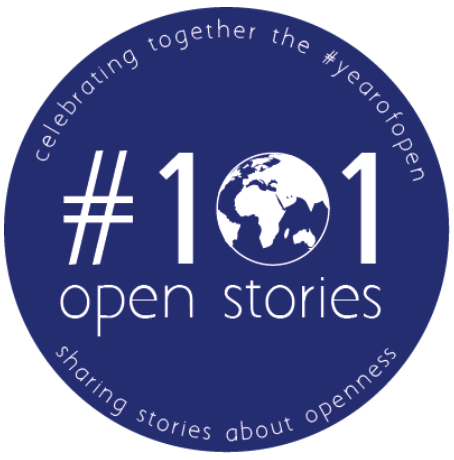
Submitted by: Chrissi Nerantzi and Team for #101openstories
Center for Excellence in Teaching & Learning (CELT)
Manchester Metropolitan University
Food for Thought Series: What is OER?
What are OER?
What is the potential value of OER?
What is my OER vision?
If you are interested in finding out more, to participate in an activity, or to engage in the discussions on creating OER during July, select one or all of the following activities.
Week 4: #YearofOpen Four Sessions of Open Storytelling, led by Jenni Hayman, member of the #101openstories team
In this four-day series of one-hour webinars, four guests per day from the open community will be invited to share stories about how they came to be aware of openness in their context, and any experiences that they have found interesting, surprising, or frustrating. The topics are completely up to the storytellers. Audience members are invited to attend live with a chat option to ask questions or comment, or to view the recorded sessions once they’ve been transcribed, captioned, and posted on the 101openstories.org website.
Sessions: (All times in Eastern Daylight Time; Toronto, Ontario)
Please confirm your local time for the sessions using the following website: https://www.worldtimebuddy.com/
Monday, July 24 at 7 am EDT
Open Stories On Air Hangout w/ @AlgersAnne @BeckPitt @mweller and @celTatis
View recorded webinar.
Tuesday, July 25 at 6 am EDT Open Stories On Air Hangout w/ @Bali_Maha @Maha4Learning @sukainaw and @catherinecronin
View recorded webinar.
Wednesday, July 26 at 6 am EDT Open Stories On Air Hangout w/ @nicolapallitt and @ShukieOne @kayoddone
View recorded webinar.
Thursday, July 27 at 12 noon EDT Open Stories On Air Hangout w/ @greeneterry and @hj_dewaard @dendroglyph and @clhendricksbc
View recorded webinar.
Week 3: Creating OER
Dear friends,
Thank you so much for stopping by. We hope you have had the opportunity to engage in some of the discussions around OER in the previous weeks. If not, please don’t worry. There is still plenty of time.
We would like to focus this week on the creation of OER and are suggesting a set of activities that will hopefully help you to get started. Viviane Vladimirschi, PhD researcher on guidelines for professional education on OER for Brazilian K-12 public schools teachers from the #101openstories team will be your guide this week supported by the rest of the team.
We would like to use some resources created based on the Week 1 introductory Food for thought clip about OER for this week’s activities. We have a set of audio resources in three different languages
An animation based on the Greek version has been developed by and we are adding it here as an example
The text has been translated into Greek by Christina Pesiou and Despina Paulidou, the audio is by Anastasia Kasimidou and Despina Pavlido, who also created this film. All are postgraduate students studying towards the MA ICT in Education at the University of Macedonia in Greece.
Activities
- Use one of the transcripts currently available in English, Portuguese or Greek and adapt it into another language. Share it with us all. So that it can be used more widely.
- Use any of the resources in the languages available or in another language to create an OER that enables interaction.
- Create your own meme indicating what OER means to you. Here are some links to open source or free meme generators:
https://memegenerator.net/instance/67126131/its-free-open-source
https://www.michaelfogleman.com/projects/imeme/
https://imgflip.com/memegenerator
How many OER can we create together and in how many different languages? Please share your creations and/or adaptations via Twitter using the hashtag #yearofopen.
Week 2: Reading about OER
Hello everybody,
Lovely to see you here and we hope you found Week 1 activities useful. If you haven’t had the chance to engage with any of these yet, please don’t worry. There is plenty of time.
This week, we would like to invite you to do some reading about OER and discuss with the wider community through conversation and storytelling. Your guide this week will be Penny Bentley (@penpln) who will be supported by other members of the #101openstories team. Two weeks ago, Penny facilitated EduTweetOz, a weekly twitter conversation for Australian teachers.
1. Select a paper from a journal or chapter from a book about OER that speaks to you and create a digital picture book in your language that captures the key messages for you. Consider using the freely available Storybird platform or another tool you prefer. See a Storybird
Από τις OER στην Ανοικτή Παιδαγωγική: Αξιοποίηση της Δύναμης της Ανοικτής και Εξ Αποστάσεως Εκπαίδευσης by KOULELISA on Storybird
Read, write, discover, and share the books you’ll always remember.
When you have created your story, share it!
Feel free to use any of the following resources or select another paper/chapter:
OER in schools
The Open Education handbook by the Open Education Working Group
The Battle for Open by Martin Weller
Open. The philosophy and practices that are revolutionizing education and science, edited by Rajiv S. Jhangiani & Robert Biswas-Diener
Open Praxis Journal
IRRODL Journal
2. Access some of the OER stories rewritten and shared and comment on these. What do they mean to you and your practice?
3. If you identified a specific gap in the OER literature/research, how could you contribute new insights? Write a blog post or tweet and share.
Remember to use the hashtag #yearofopen on Twitter so that we can all easily find it. We are exciting about this week’s activities and can’t wait to see your creations.
Week 1: Creating OER
1. Watch the Food for Thought video about OER and share your response to the questions at the end of the video.
2. Would like to do a little bit more? Create your own OER clip articulating your responses to the questions used in the above clip or articulate your own: What are OER? What is the potential value of OER? and What is your OER vision?
3. OER also opens opportunities for creative dialogue. Therefore, we would like to encourage you to engage with another OER creator to discuss their (and your) contributions. What are you taking away from this exchange? Consider selecting a Creative Commons License for your creations. It would be wonderful to get OER clips and other artifacts in a wide range of languages.
Share your responses to the activities with us on Twitter. Remember to add #yearofopen so that we can all locate it easily.
We can’t wait to watch your contributions.
Note: The complete Food for Thought Series is openly licensed.
What is OER?

Open Perspective on OER
Submitted by: Martijn Ouwehand
Product Manager Open Education, TU Delft, Netherlands
To me it is not so much about the OER itself, but about what you can do with it. The fact that so many high quality educational resources are available, created by anyone, and the ability to reuse, revise and remix educational resources without having to ask permission or high cost, harnesses incredible power.
The vast amount of high quality resources, open to do with it what you need, without cost, lowers barriers to learn and increases the range of ways you can help others (like your students, colleagues, friends, etc) to learn and/or teach. Since the educational resources are already available, there is more room to channel your efforts towards how to use them effectively, challenging you to grow your creativity in teaching and helping people to learn and understand topics you are more familiar with.
OER has the power to bring together people in the same field of expertise. Hopefully, eventually, OER enable people independent of geographical location or institution to find each other, form communities and work together. Working together in that sense, to me, goes beyond sharing resources. It encompasses jointly increasing the quality of the OER created by its community members, exchanging experiences in teaching and how to work with the OER, and eventually really work together to teach and help others to learn, where each OER supplements each other and each community member supplements the next, both in informal settings, and, so I hope, in formal (Higher Educational) settings.

Submitted by: Joe Wilson MA, MBA , DipEd , PGCSE
@joecar
What is OER ?
Open educational resources are materials that come with a Creative Commons or other relevant open licence which allows them to be used freely and repurposed, normally with an appropriate attribution.
Why is this important ?
The ability to create, source , re-purpose, use and publish open educational resources is a subset of broader open educational practices but OER needs some national policy drivers to encourage their adoption and the practices associated with them.
In some countries OER, in the form of open textbooks, are seen as a cost effective way to make learning more accessible. In countries like Scotland where the curriculum is not so text book driven and education is already seen as a lifelong common good , access to open educational resources can expand access to education, widen participation, create new opportunities for teachers and learners at every stage of learning, while creating a culture of institutional collaboration and sharing both across Scotland and globally.
The challenges we face in Scotland are not unique. Our ambitions are in line those of UNESCO.
What Changes do you hope they will bring ?
In Scotland the adoption of policy and practice around open educational resources will break down the silos between learning in school, college, university, in the community and in the workplace. We founded Open Scotland and published the Open Scotland Declaration to encourage policy makers and institutions in Scotland to adopt more open practices, this including fostering an understanding of open educational resources.
An understanding of OER should be embedded in initial teacher training and in the continuing professional development of all staff working in and around education. This should include staff working in public galleries, libraries and museums and indeed anyone creating publicly funded learning materials.
What is the future of OER?
- There will be a growth in national and international repositories or other means of curating open educational resources.
- The barriers to learning nationally and globally will be broken down.
- New services will emerge using artificial intelligence to harvest and deliver OER in a much more personalized way.
- Learning materials will increasingly be co-created by teachers and learners.
- The space that commercial publishers operate in will become a much more innovative one.
Scottish Open Education Declaration
#openscot Open Scotland UNESCO Forum Reflections
OER Resources
Successful OER Adoption Models: Academic Libraries Leading the Way
New Washington State Bill Seeks to Increase OER Use and Development
Vetting OER for Cultural Relevance, Accessible, and Licensing (webinar)
Why Open Educational Resources are essential for learning (webinar)
Open Education Europa, May discussion on Open Education Resources
Advancing OER Through Effective Policy, Amanda Coolidge and Nicole Allen (May 2017)
How we can use Open Education, sharing and collaboration across traditional boundaries to innovate and develop eye care training, Dr Glenda Cox, University of Cape Town and Mr Gregory Doyle, University of Cape Town
Open Educational Practices (OEP) for teaching in higher education, Catherine Cronin, Centre for Excellence in Learning & Teaching (CELT), National University of Ireland, Galway





